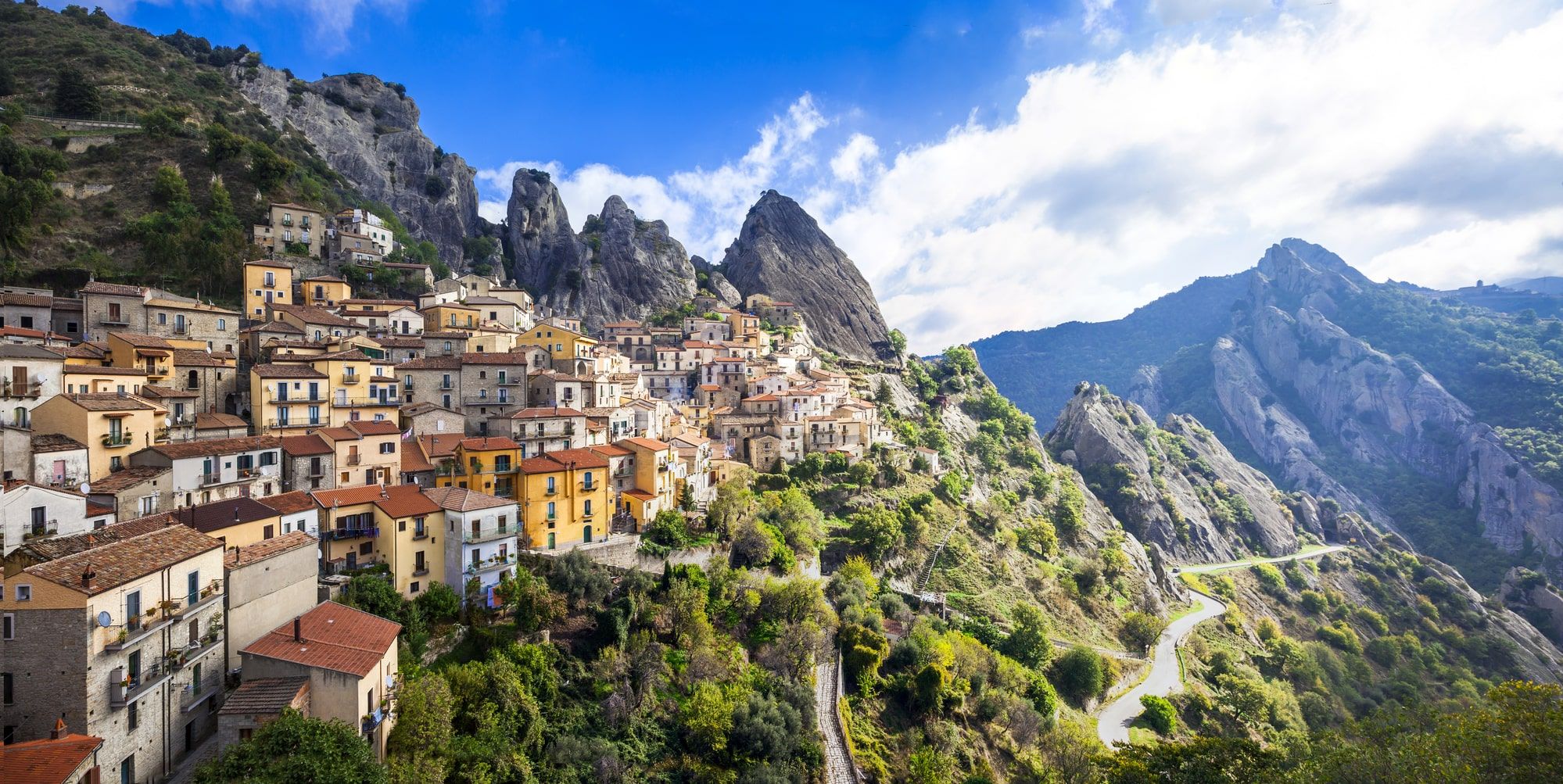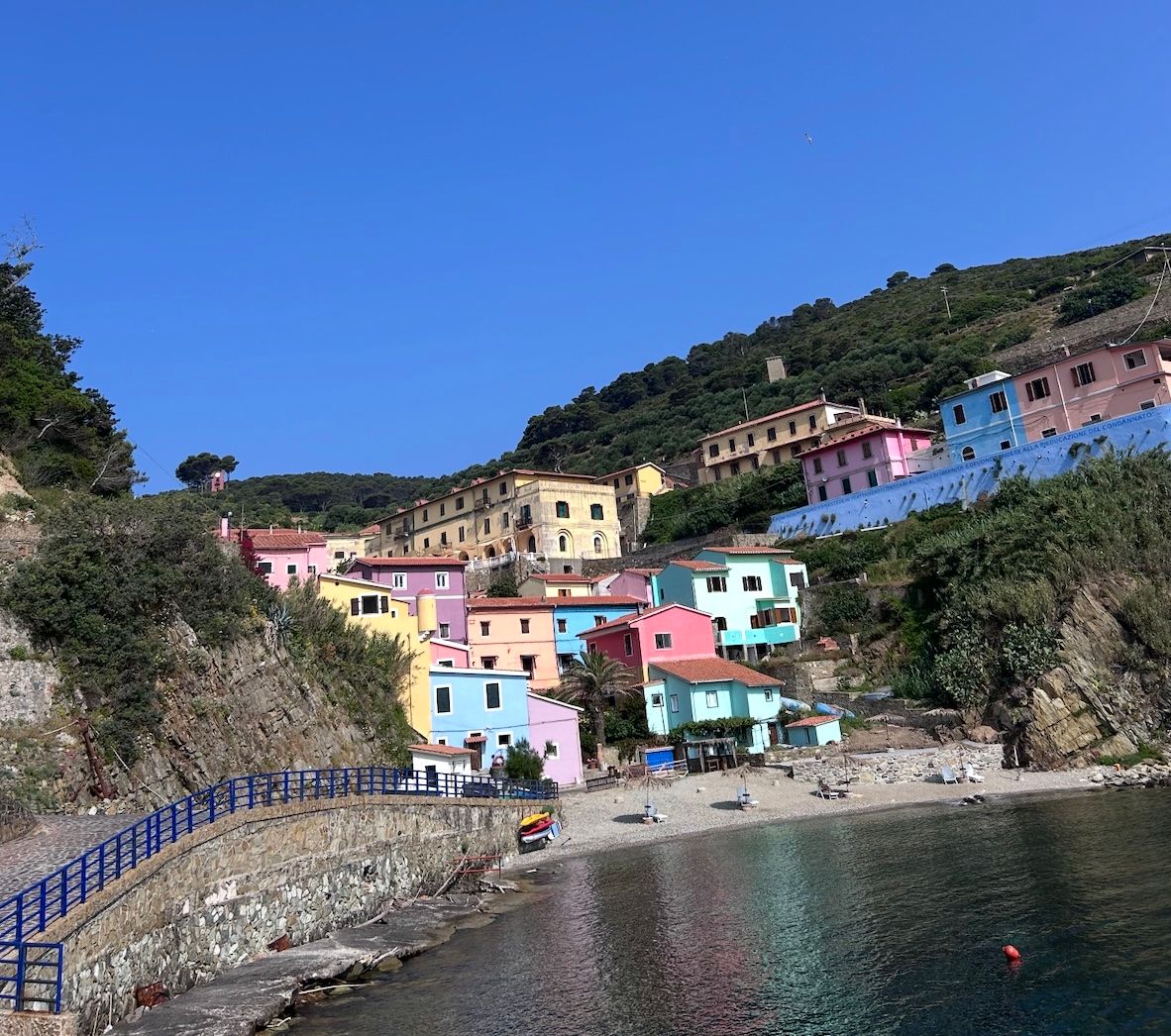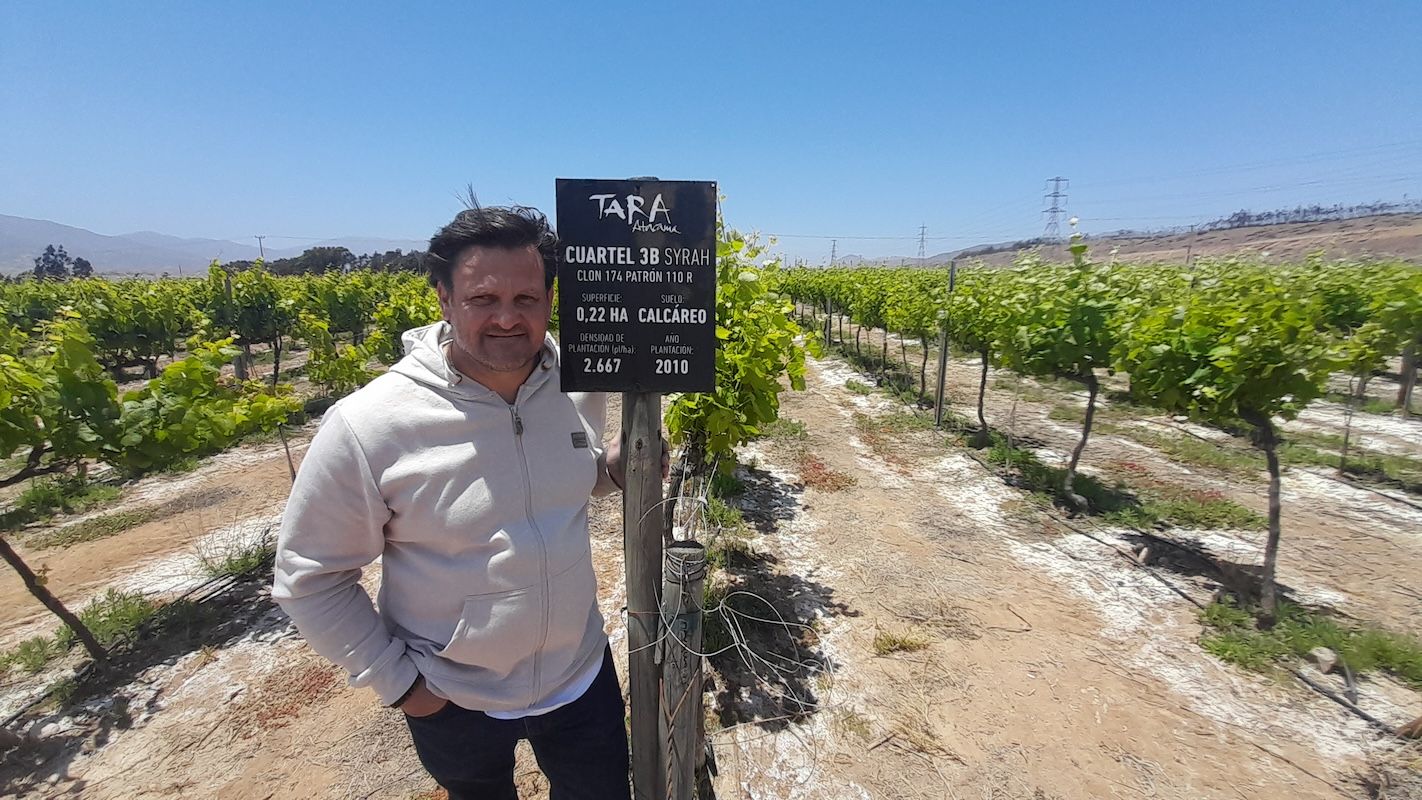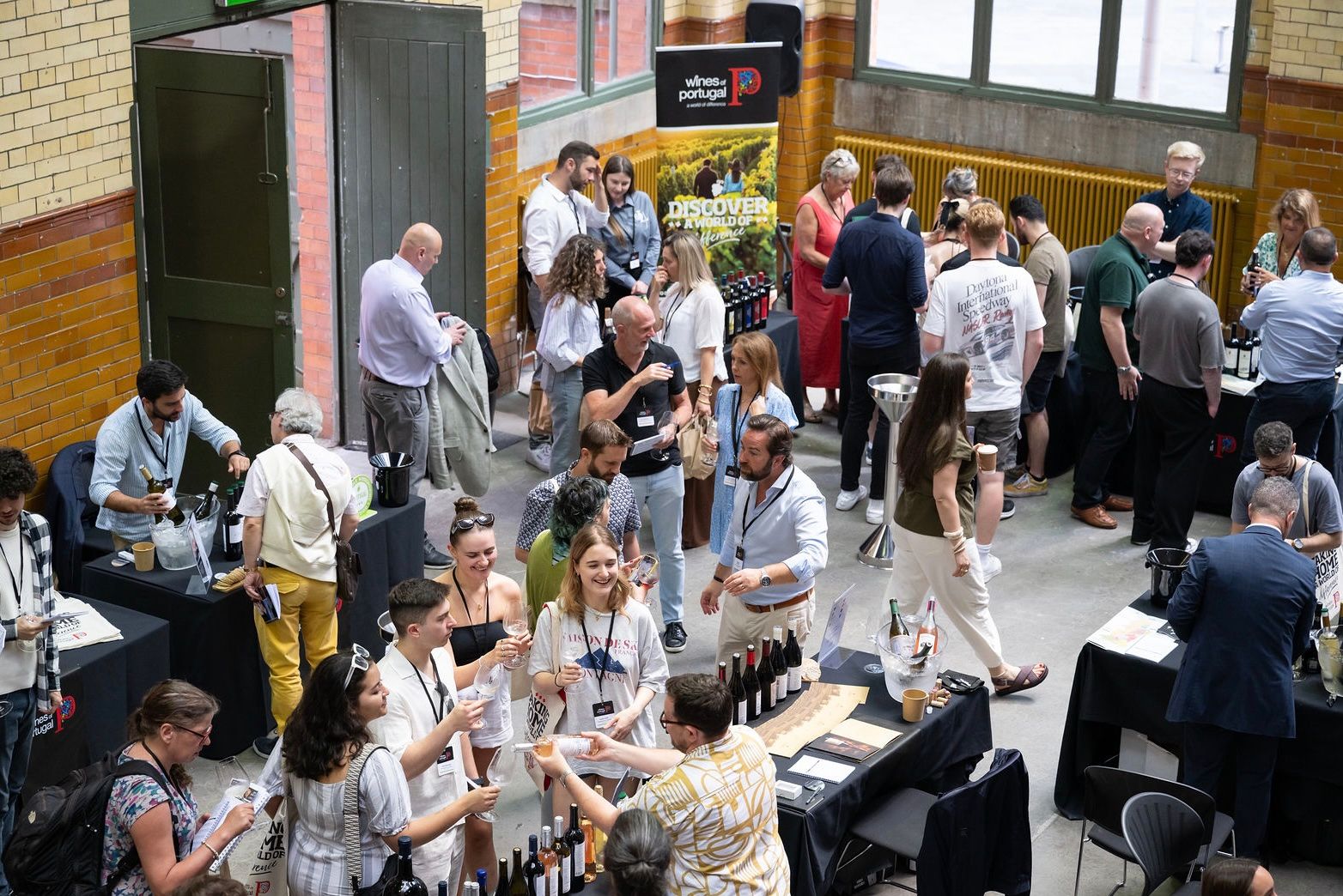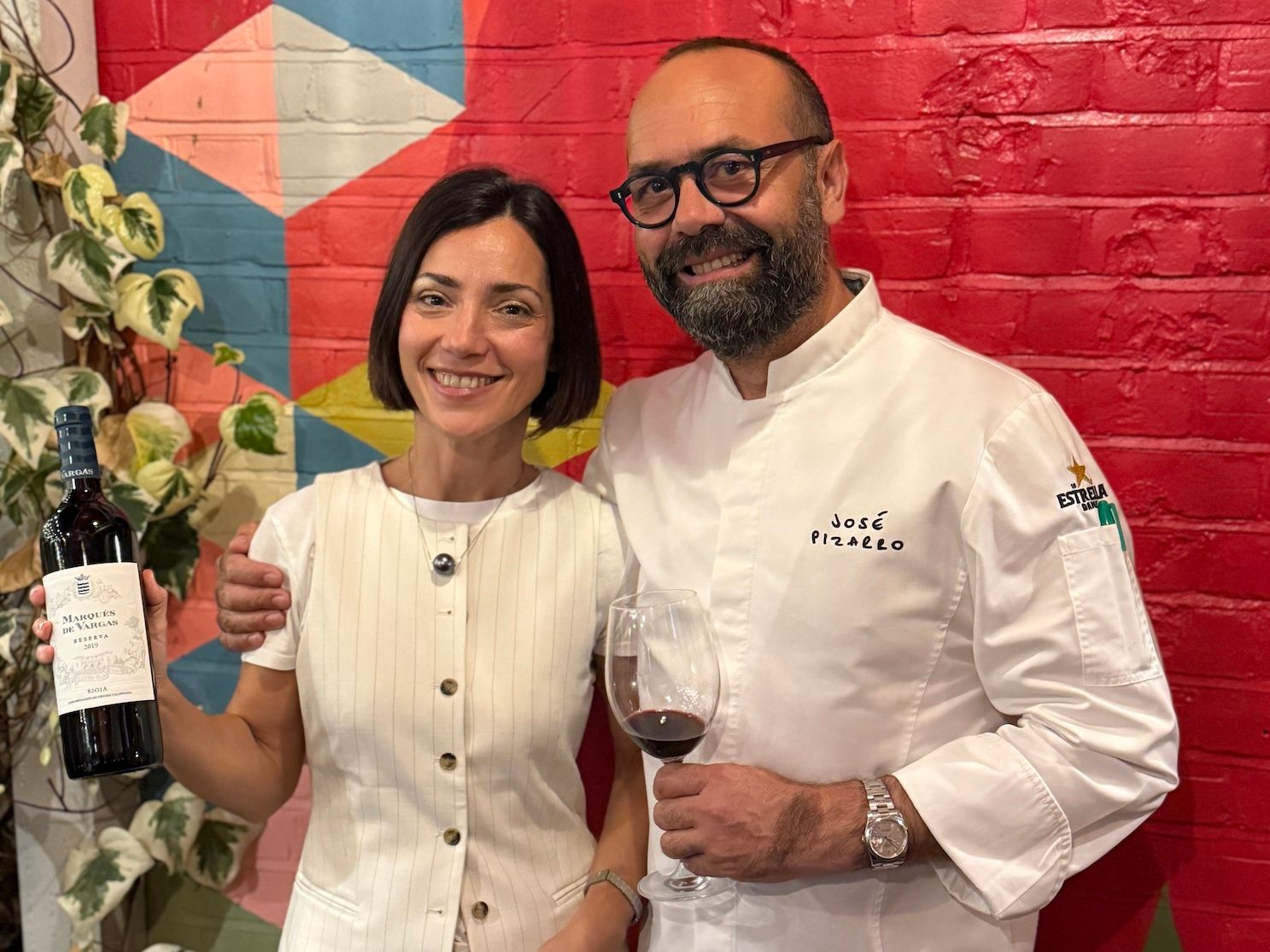Paul Caputo’s article was one of the finalists in the 2021 wine web writing competition organised by hungarianwines.eu run by Ágnes Németh.
Aglianico del Vulture must be considered one of the great terroirs of Italy. Its ruggedly beautiful terrain tumbles from the foothills of Monte Vulture, an ancient and extinct volcano situated in the thick of the Mezzogiorno. At dusk, its talon shaped crater crafts an eerie silhouette against the crimson sky and the little lights of the Vulture’s (vul-tur-aay) hilltop villages flicker beneath the stars. This is a wine that looms large in the hearts and minds of its admirers, for to truly understand the Aglianico grown in these ancient soils, is to understand Basilicata and its culture of struggle.
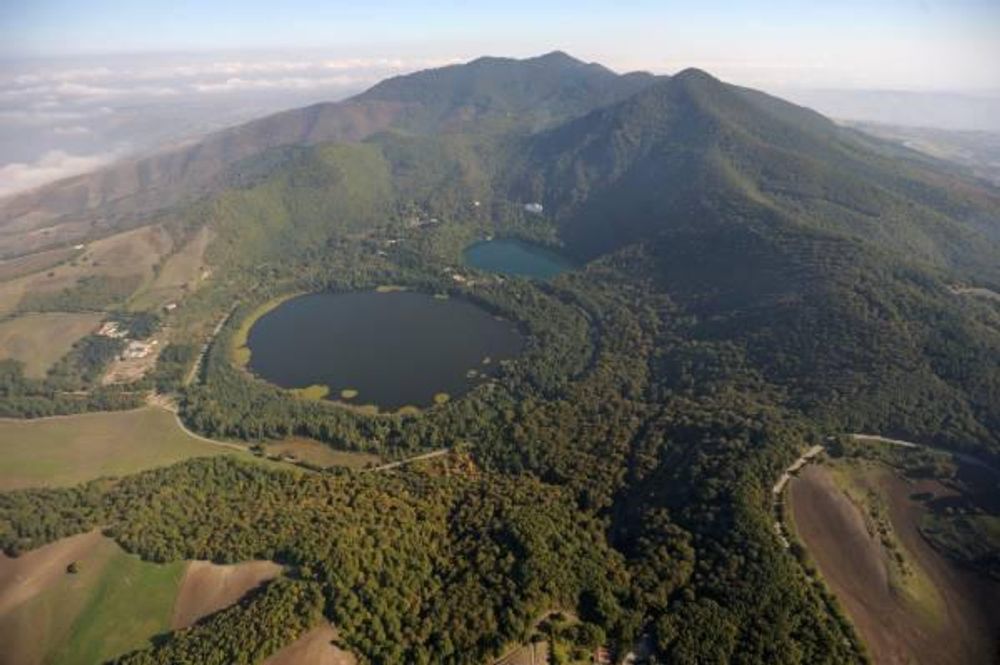
The extinct Monte Vulture volcano that has such an influence on the wine that can be grown in this part of southern Italy. Picture Alex Strekeisen
The last 10 years have seen a flurry of excitement around the variety and region. Volcanic wines are cool, of course, but this growing curiosity has built on the expanding reputation of Taurasi, neighbouring Campania’s key Aglianico-based red. The Vulture zone is different though. Not only is the Aglianico grown here thought to be a distinct biotype, with its own subtly individual characteristics, the rise in altitude and the area’s propensity for significant variation in vintage conditions ensure an altogether different style of wine.
In the glass, aromas of black cherry, balsam and the floral fragrance of cut violets are typical, while on the palate the best are medium bodied with a strong backbone of tannin and acidity. They are what you might call big red wines, but fashioned in a form more akin to the slopes of Piedmont than the plains of Puglia. In reality though, such simplicity will not do. The 15 or so villages that make up the Aglianico del Vulture DOC vary in their geological makeup, and if and when wines are made without the heavy hand of man, the grape ostensibly reflects those contrasts.
Barile, meaning barrel in Italian, is one of the key villages. Here, the panorama of ancient caves carved into the tufo-rock hillsides provides an evocative backdrop for the impressionable traveller. They also provide makeshift cellars for local wine growers and allow for the steady maturation of Aglianico, their naturally cool temperatures providing a welcome shelter from the area’s invasive summer heat.
The Mastrodomenico family
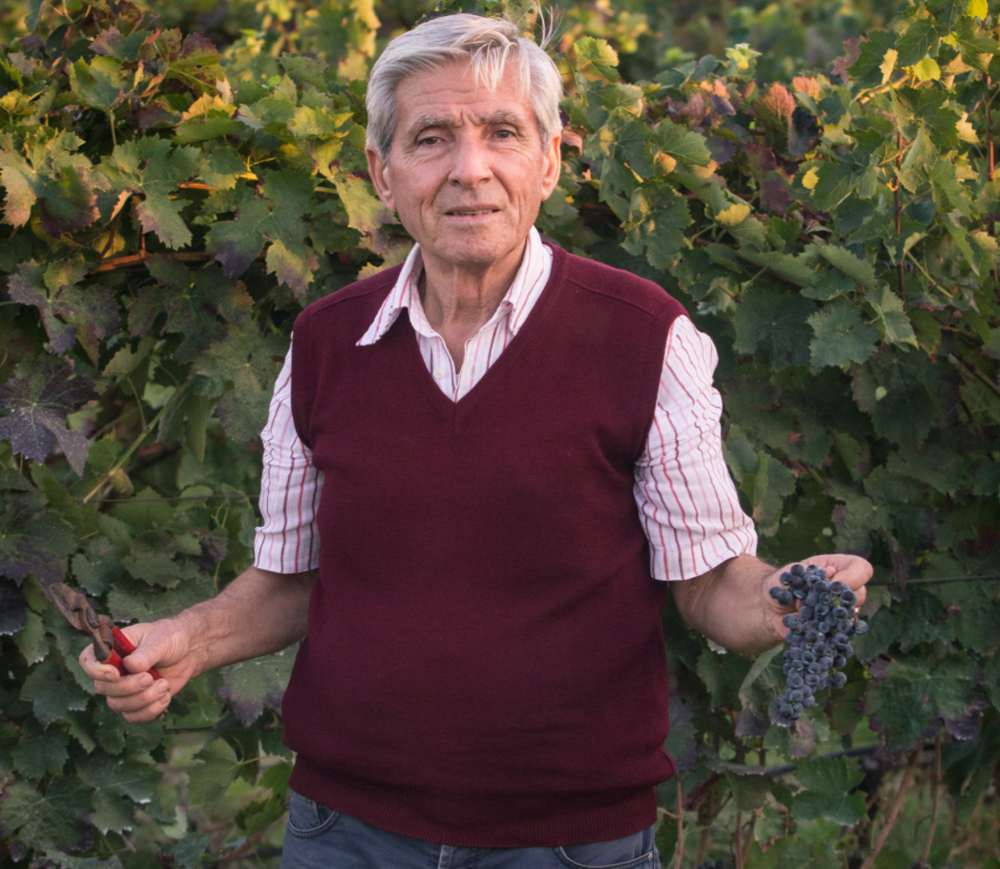
Donato Mastrodomenico and his wife Dina have been one of the most influential wine producers in the
Each October, for Aglianico is one of the last grapes to be harvested in Italy, the Mastrodomenico family bring their tractor load of grapes to one such cave. In the doorway they de-stem the fruit and fermentation takes place in stainless steel and a lengthy sojourn in old wood takes place at the back of the cantina. ‘Likos’, the family’s flagship wine, is made in this simple way, and over the years has quietly racked up acclaim. By implication, it is one of Aglianico’s cult status wines.
Such a shift in global appreciation for the variety is not lost on the family. They knew this day would come. Their winemaking journey is not the continuation of a life set in motion generations earlier, but rather, based on a calculated belief in the potential of their land to find rapport with Aglianico. Today, under the most challenging conditions we’ve seen in decades, the business is spearheaded by Emanuela Mastrodomenico and her brother Giuseppe, the two children of Donato Mastrodomenico and Dina Grimolizzi.
Historically the Grimolizzis were big landowners. They cultivated wine grapes, but also grain and olives. The family estate was known as a masseria, a sort of fortified and self sufficient farm house that traded in a range of different crops and livestock. Much of the family holdings were located on the edge of Rapolla, at the foot of Monte Vulture, an area known as the Aquarossa district for its soil’s high iron content. There was also terrain to the north of Barile, a contrada, known as Torre di Bozze.
Dina continuously challenged and pushed the boundaries. Not only was she the first in the village to graduate, in languages no less, she was also the first to wear a miniskirt locally – an edgy and progressive move amid the rural and patriarchal settings of 1960s Basilicata. The youngest child in the family, she lost her father young, to a heart attack while returning from the fields. Everyone had to roll their sleeves up, and take on a share of responsibility for the family business.
Challenging environment
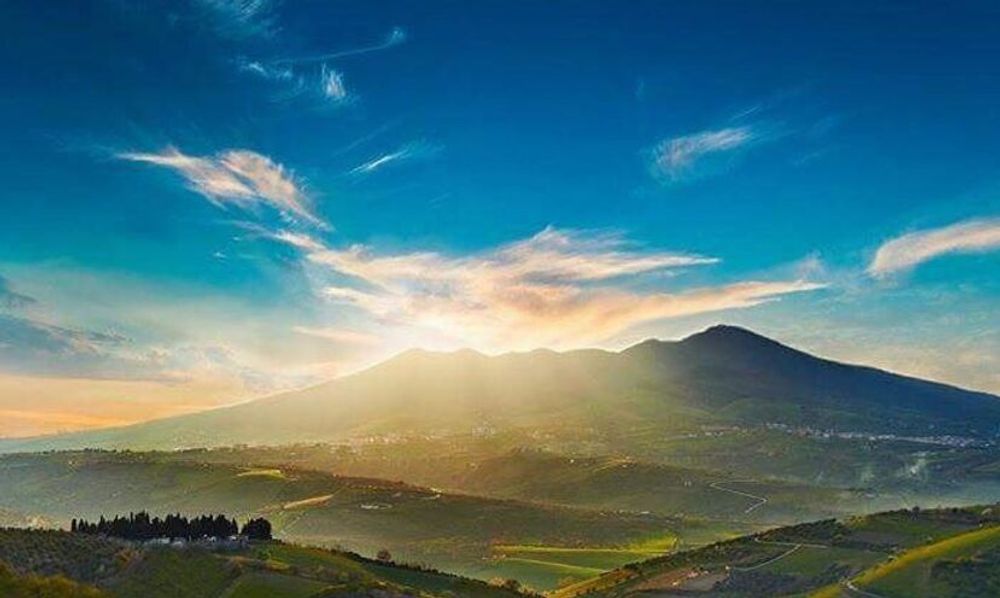
The unique volcanic soils of Aglianico del Vulture DOC in the foothills of the extinct volcano
The Italian south was a challenging place to do business in. Widespread poverty, inadequate infrastructure, youth migration to the North, corruption and organised crime provided a very real backdrop. Nevertheless, there were opportunities amongst the difficulties, and in the early 1980s, Donato’s passion for agriculture led him to purchase a plot of vines in Puglia. He chose a spot in Loconia di Canosa, along the old road that leads to Barletta. Here he grew table grapes and life moved to the rhythm of family and the seasons. Donato had met and married Dina in the early 1970s. Emanuela was born in Naples in 1976 and Giuseppe in March of 1980, the year a devastating earthquake rattled through Irpinia and Basilicata, registering 6.9 on the richter scale and killing over 2500 people.
The mid to late 80s ushered in a new cultural era, however, and a note of confidence and ambition trickled down into public consciousness. It was the age of big business personalities, exemplified perhaps by Berlusconi and his vast media empire. With the first Italian hosted World Cup since 1934 on the horizon, there was a sense of optimism in the air. The decision was made. Donato would sell his land in Puglia and invest the proceeds to help transform Dina’s dowry and inherited land into vineyards suitable for the rigours of modern commerce.
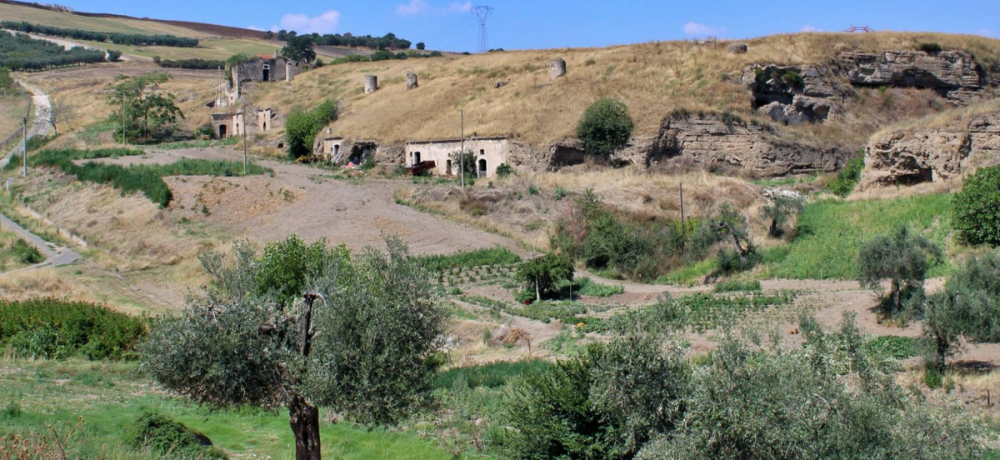
The Mastrodomenicos have worked tirelessly to first understand and then improve the quality of the wines they can make
Donato and Dina had their heads switched on though. They were ambitious for their children and emphasised the importance of study and of establishing a professional career for themselves. Farming was hard work, and at the time it was far from glamorous. Aglianico del Vulture may have been granted DOC status in 1969, but early entrepreneurial enthusiasm had largely subsided. Only a handful of companies had really established themselves and most people involved in small scale agriculture were realistic about the limited opportunities available without significant investment capital. In fact, it would take almost a decade to sell the land and prepare Dina’s family domain for premium winemaking.
It was with great pride then that Emanuela’s parents received the news that she had her heart set on law. She graduated in 2002 and immediately started to contemplate her possible future as a magistrate. Showing signs of her mother’s ambition, she embarked on three studious years at one of the best schools in Rome, winning a doctoral scholarship in administrative law in Turin. A prosperous future was marked out ahead of her, and despite a nostalgia for the rustic trappings of village life in Italy’s most sparsely populated region, the comforts and luxuries of cosmopolitanism beckoned.
Giuseppe showed a similar drive too. His curiosity and practical aptitude for problem solving led him into engineering, and he soon followed his sister to Turin. His studies would later facilitate an innovative vineyard sensor system, which could monitor key climatic markers in order to support decision making, as well as a full ‘farm to fork’ traceability program.
Growing reputation
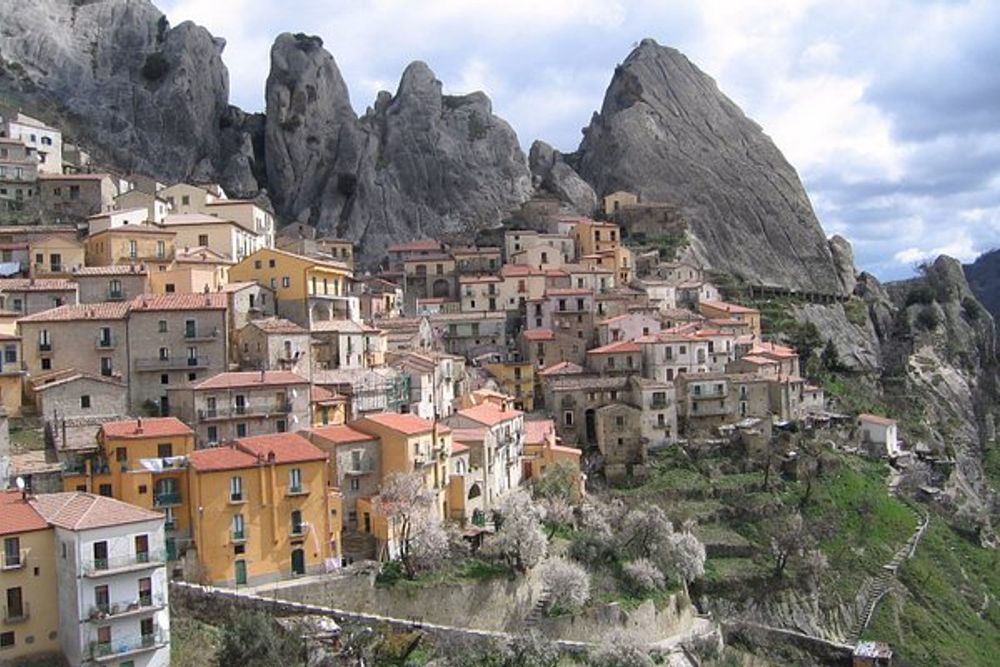
The stunning town of Barile is home to caves full of wines from local producers
Back home in Barile, Donato and Dina contemplated their progress in the vineyards. Donato had renovated one of the old grotto cellars and his growing experience amongst the vines was paying dividends. The family boasted a reputation for cultivating high quality fruit and quietly sold to a number of the appellation’s important estates – notably to an expanding Cantine del Notaio. Following the project from distance, Emanuela felt the buzz and excitement grow. They began looking at things differently. Not only was there a feeling that the world might be ready for Aglianico, there was a belief that this could, after all, be a real business.
As the millennium came and went, other small growers were starting to consider taking the leap from their ability to grow outstanding wine grapes, there was no reason to think that the Mastrodomenico family couldn’t stake their claim and be part of the Vulture’s mini gold rush. In the autumn of 2005, the family harvested a crop that would become 2,000 bottles of Likos, a full-bodied red produced exclusively from the Aglianico del Vulture grape. Although production was small, symbolically the release represented the fruits of two decades worth of cautious development, a journey of steady education and familiarity with their eight hectare vineyard.
From distance, Emanuela watched excitement around the wine business grow. The rush of exhilaration that came with attending VinItaly the following year opened their eyes to the new world they had entered. Under the same roof as the great winemaking dynasties of Italy, the whole family turned out to showcase Likos and introduce their interpretation of the Vulture to the world. Giuseppe arrived in Verona full of cold, but couldn’t hold back the tears as he took in the scene – his sister sporting a new suit and jacket as his mother laid out a table cloth, hand embroidered with pine cones, an heirloom Emanuela now guards with great sentiment.
The project they had invested so many years in had evolved into something rather special. Orders from the Far East followed, and again a great rush of emotion greeted Emanuela as she accompanied her brother to Naples before his first flight to Japan. The notion that Donato and Dina’s little vineyard project had forged relationships on the opposite side of the world began to dawn. They had been selected by one of Japan’s legendary sommeliers, Kazuo Naito. Likos received a glowing review from Jancis Robinson in her Financial Times weekend column, and for a brief interlude, the 2007 vintage was imported into the UK by this enthusiastic writer.
Building momentum
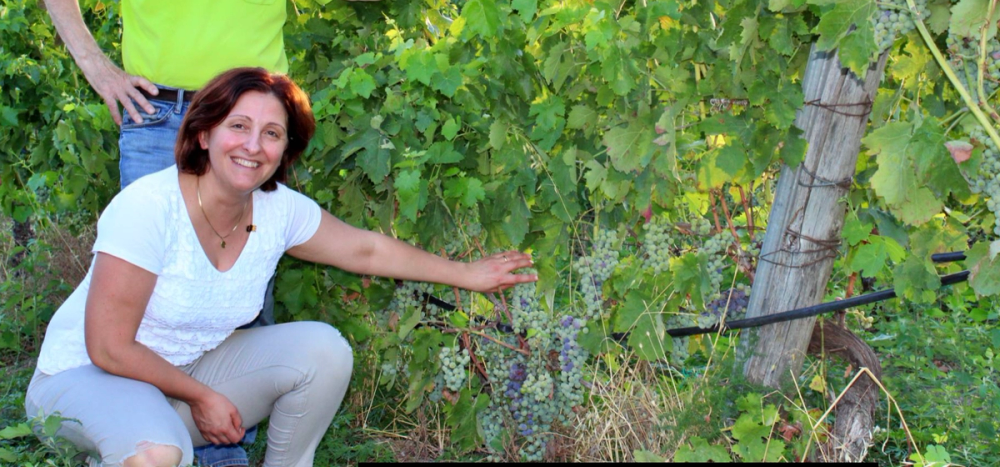
Emanuela Mastrodomenico now helps run the family business with her brother Giusseppe alongside their father Donato
Momentum continued to build and despite the global economic crisis that sent shockwaves throughout the international wine trade in 2008, Vigne Mastrodomenico continued to develop. Enthusiasm for the wines was steadily climbing, both at home and abroad, and everyone continued to muck in when and where needed. All the while they strived to learn more about Aglianico’s affinity with their soils in Rapolla.
Tragically, trouble in the markets was far from the only black cloud on the horizon. In the summer of 2018 Dina was diagnosed with a brain ischemia, a condition that prevents the necessary blood flow to the brain. It hit the family like a lightening bolt. The suffering was long and frequently heartbreaking. There were times when despair threatened to engulf each harvest with a sense of insignificance and futility. Under the circumstances, carrying on as normal was an emotionally troubling obligation.
Dina passed away in 2018 and the relentless grief inevitably spilled into the day to day running of the business. Donato was naturally devastated. Not only had he lost his wife and his best friend, the vineyards represented a life’s work, and certainly an endeavour inherently grounded in the family’s shared dreams. Yet in the penultimate months of anguish, Dina insisted on some ground rules for the future. Her steadfast resolve and determination remained present throughout the darkest of days. Giuseppe and Emanuela were to remain united in their ideas and activities, and support their father in upholding the family legacy.
Despite his accumulating years, Donato continues to work the vineyards each day. His meticulous understanding of each vine amounts to an arsenal of insight, that bit by bit, he attempts to communicate to Emanuela. As one might expect, they are stubborn characters and tensions can flare. Yet behind their occasional battles lies a commitment to ensure Vigne Mastrodomenico remains associated with the upper echelons of the Aglianico conversation.
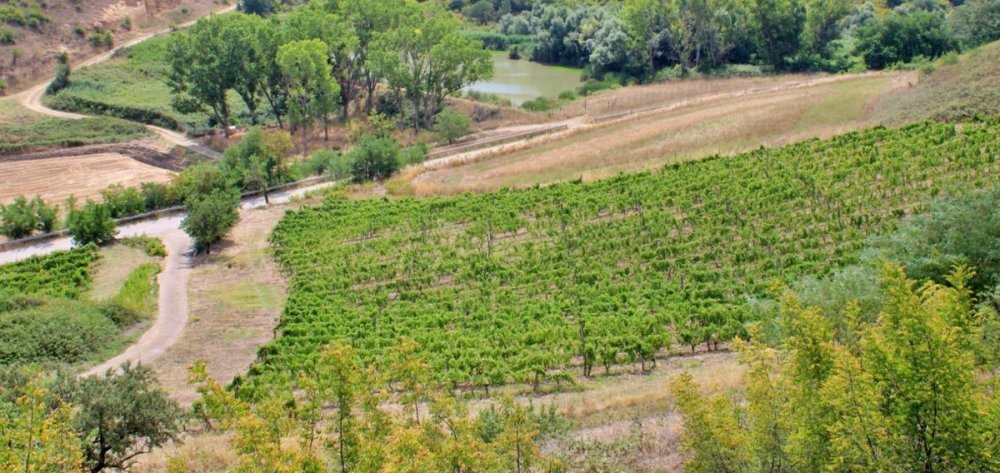
Vigne Mastrodomenico is doing what it can to promote and produce quality Aglianico wines
Giuseppe, perhaps sheltered from the epicentre, continues to support from his home in Turin. In the early days of the project he did much for the business, taking trips abroad and promoting Likos wherever he could. Nevertheless, his career in engineering developed alongside his passion for the family domain, and for now at least, opportunities from outside the sector take precedence. With Emanuela firmly settled back in the Vulture however, faith in the positive trajectory endures.
Challenging times
When the news of a pandemic and global lockdown reached Barile, the ramifications were obvious. With the majority of the family’s clients pausing their operations, the reality of another period of intense struggle hit head on. Life will undoubtedly be challenging for a period, but the silver lining in the sky remains bright. Aglianico is a variety that lends itself to patience and the gradual maturation of Likos is one of the great assets of the appellation. Its black cherry and balsam fragrance skates with elegance on a rink of brooding varietal power and judging from the library of back vintages quietly evolving in the cellar, it is clear Likos is one of the great wines of southern Italy.
In those appallingly miserable days, when Donato, Giuseppe and Emanuela mustered the courage to deliver their premature goodbyes, Dina demanded a promise from her children – that the adventure embarked on more than 30 years earlier would not conclude in her absence. Instead, they were to fight for the future of the winery and to protect the legacy of their parents, while at the same time enhancing their respectful connection with the land.
Over the coming months and years we’ll have the opportunity to taste that promise, and sensing in Emanuela the determined traits of her mother, one suspects that the adventure is only just beginning.
- If you would like to read more of Paul Caputo’s writing you can do at his blog and specialist Italian wine site Vinorandum.
- This article was first published on Paul’s site here.
